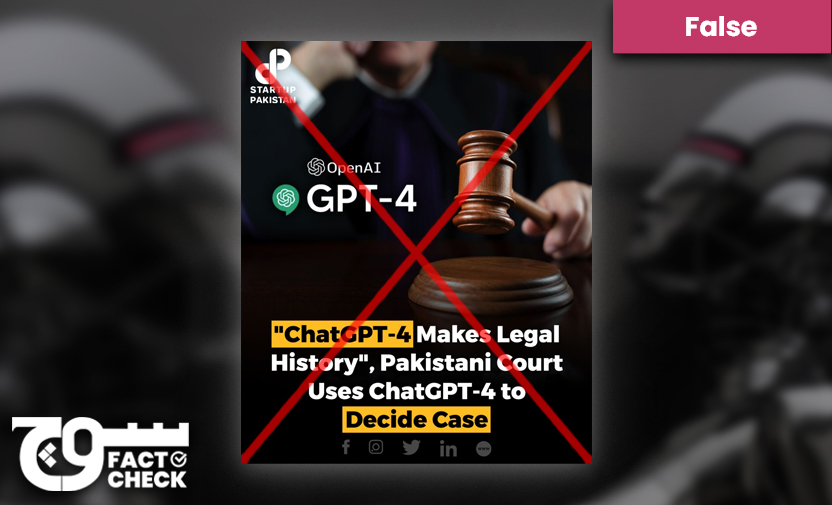
Claim: A court in Pakistan’s Punjab province used artificial intelligence (AI) chatbot ChatGPT-4 to make a decision in a legal case involving a dispute between two parties over a contract.
Fact: The decision of the bail petition was not made by or with the help of ChatGPT, but Judge Amir Munir only consulted the artificial intelligence chatbot to test if artificial intelligence could be used in the justice system and whether it would be effective. The bail application was made in a rape case, not a dispute over a contract. Lastly, countries such as China, Dubai, India, and Colombia have already used or started using ChatGPT in their judicial system.
On 11 April 2023, Facebook page ‘Startup Pakistan’ posted a visual news story (archive), containing the following text:
“‘ChatGPT-4 Makes Legal History’, Pakistani Court Uses ChatGPT 4 to Decide Case”
The post included the link to a news article (archive) on the website of Startup Pakistan. The story has the following three paragraphs in it:
“In a landmark decision, a Pakistani court has made legal history by using ChatGPT-4, a large language model developed by OpenAI, to decide a case. This is the first time an artificial intelligence system has been used in a court of law to make a decision.
The case in question involved a dispute over a contract between two parties. The court was presented with a large amount of text, including the agreement and various communications between the parties.
According to the FIR, the petitioner, a child of around 13 years old, was accused of taking the complainant’s nine-year-old son and taking him to a desolate location.”
The news article is about a judgement passed by Additional District & Sessions Judge Muhammad Amir Munir in the Phalia town of the Mandi Bahauddin district’s Phalia tehsil. The ruling pertains to the bail petition of a minor accused of kidnapping and sexually assaulting a nine-year-old boy.
“A juvenile of approximately 13 years, is nominated allegedly for kidnapping 9 years old minor son of the complainant to a deserted place, whereafter, and on gun point, he made an attempt to commit unnatural offences with him,” reads the court order, describing the offence.
Fact or Fiction?
Soch Fact Check obtained a copy of the judgement, following the perusal of which we ascertained that the decision of the bail petition was not made by or with the help of ChatGPT but that the judge only consulted the artificial intelligence chatbot for “testing the functionality and experimenting the use of artificial intelligence for the judges, courts and the justice system”.
Parts of the court order are reproduced below to provide evidence that the judgement was neither made by nor based on ChatGPT-4.
- “Before parting with this, I have considered to experiment chatGPT 4, an online AI software developed by openai.com that works on artificial intelligence (AI). Discussion to follow will be interesting for readers of this Order.”
- “Although, this court has already given the above reasons on the basis of facts and circumstances of this case to accept this pre-arrest bail application but just to test the power and dynamics of ChatbotGPT4 as to what answers it has on the proposition, I have asked Chatbot GPT4 some questions.”
- “It should also be noted that my decision to allow this prearrest bail application is not based on the answers to be provided by the artificial intelligence program Chatbot GPT4. At the moment, same is based on application of traditional judicial mind by this court.”
- “Earlier on, this court has also used Chatbot GPT 4 in a civil matter and found the results interesting. This is merely mentioned as a reference here.”
It is also worth noting that this was not the first time an artificial intelligence system had been used in a court of law to make a decision. Countries such as China, Dubai, India, and Colombia have already used or started using ChatGPT in their judicial system.
The news report by ‘Startup Pakistan’ also omits or misrepresents certain facts; for example, it incorrectly states that the “case in question involved a dispute over a contract between two parties” and that “the petitioner, a child of around 13 years old, was accused of taking the complainant’s nine-year-old son and taking him to a desolate location”.
The case was not a dispute over a contract but a case of alleged sexual assault. Furthermore, the petitioner is accused of kidnapping as well, not just “taking him [complainant’s nine-year-old son] to a desolate location”.
Virality
Soch Fact Check found the false posts here, here, here, here, here, here, here, here, here, and here on Facebook.
On Instagram, startuppakistan, megalifestyle.tv, and anokhay.official shared the incorrect reports. They also appeared here, here, here, here, here, here, and here on Twitter.
News outlets such as Firstpost (archive), Global Village Space (archive), Samaa TV (archive), and Interesting Engineering (archive) also shared the incorrect information, with their respective posts on Facebook available here, here, here, here, here, and here.
Conclusion: The decision of the bail petition was not made by or with the help of ChatGPT, but Judge Amir Munir only consulted the artificial intelligence chatbot to test if artificial intelligence could be used in the justice system and whether it would be effective. The bail application was made in a rape case, not a dispute over a contract. Lastly, countries such as China, Dubai, India, and Colombia have already used or started using ChatGPT in their judicial system.
Background image in cover photo: Xu Haiwei
